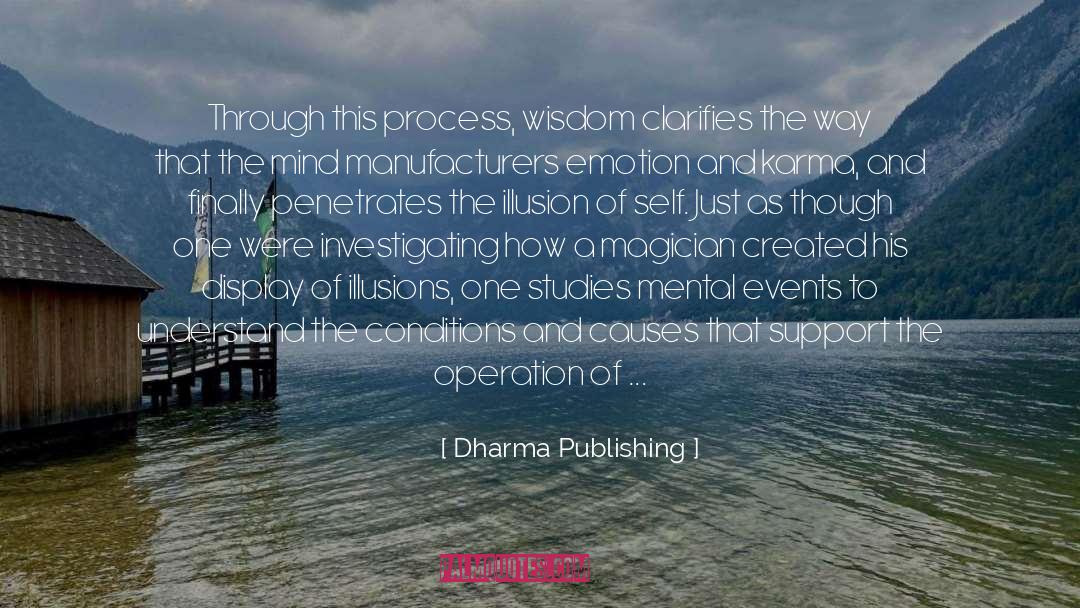Dharma Publishing Famous Quotes
Reading Dharma Publishing quotes, download and share images of famous quotes by Dharma Publishing. Righ click to see or save pictures of Dharma Publishing quotes that you can use as your wallpaper for free.
Through this process, wisdom clarifies the way that the mind manufacturers emotion and karma, and finally penetrates the illusion of self. Just as though one were investigating how a magician created his display of illusions, one studies mental events to understand the conditions and causes that support the operation of ordinary self-oriented experience. One first understands the root emotions as the basis for samsara, then studies the workings of the associated emotions and how each one manifests a distinctive character. Gradually, the manner in which the self supports emotion and emotion supports the sense of self becomes clear. Self and emotion are seen as relying on and reinforcing each other's existence. Understanding how this collusion gives rise to the whole range of samsaric delusion liberates the mind from all forms of deception.

Actively, we are motivated by the never-ending desires of the self. We are compelled to pursue whatever the self imagines will satisfy its desires. We are convinced that satisfaction of desire is the source of true happiness.
Yet the very nature of desire does not permit happiness. Like trying to quench one's thirst by drinking salt water, satisfying desire only stimulates the flow of desire. In the wake of fulfillment, desire once more stirs and reaches out. There is never lasting satisfaction, not even completion.

Involvement with the eight worldly dharmas keeps beings imprisoned in the realms of samsara and renders them susceptible to the hosts of emotions. The eight worldly dharmas are: praise and blame, gain and loss, fame and disgrace, happiness and suffering.
The eight worldly dharmas constitute our attachment to hopes and fears: We hope for praise, gain, fame, and happiness while fearing blame, loss, disgrace, and suffering. Entangled in these eight concerns, we give our energy and intelligence to the pursuit of these hopes and the avoidance of these fears. Our way of thinking is completely dominated by these eight concerns, which the world proclaims to be of utmost importance. But Śāntideva reminds us that to achieve true peace of mind, one must "... turn this thinking upside down," becoming indifferent to hope and unmoved by fear.

Following feeling, relying on liking or wanting, we are not free. The freedom to "do as we like" is not freedom of choice because we are ruled by the powerful property of feeling; we cannot choose apart from liking and disliking. Likes and dislikes may be articulated in the form of sophisticated-sounding opinions, but the decision is made for us by feeling.
The Western world places a high value on personal feelings and opinions: Each individual "has a right" to an opinion. But rarely do we question how we have arrived at our opinion. Upon examination, we may discover that opinions tend to stem from convenience, familiarity, and selfishness–what feels good or what is pleasing or comfortable to us. Upon this basis, we act, and receive the consequences of our action.
Even if we compile a large number of such opinions, there is no guarantee that we will develop a wise perspective as a ground for action. Often this process only creates a mass of confusion, for opinions of one individual tend to conflict with the opinions of another. If there appears to be agreement, we tend to assume this agreement will remain stable. But agreement only means that the needs of the individuals involved are temporarily similar, and when those needs shift, agreement will evaporate.
To make certain decisions, we rely on logic or scientific findings, which are supposedly free from personal opinion but are still weighted with the opinions of a particular culture. This

Both outer and inner phenomena arise as a result of causes and conditions. Outer phenomena, the things of the physical world, arise in a series of seven steps. The texts use the example of a seed giving rise to a plant that gives rise to a fruit. The seven steps are: seed, sprout, leaflets, stemmed plant, bud, flower, fruit. Each stage succeeds the previous one in time and in order, each giving rise to the next.

The idea persists that faith is a remnant of an ancient way of life, a way of knowing that asks for unthinking acceptance of a belief system or adherence to specific dogma. This may be the case for some spiritual traditions, but the Buddha insisted that his disciples investigate his teachings with the powers of reason, test them in the inner laboratory of meditation, and build their faith on a firm foundation of knowledge. As a result, faith in the Dharma implies faith in one's ability to recognize truth when it presents itself and to take responsibility for verifying it through analysis and meditative experience.

